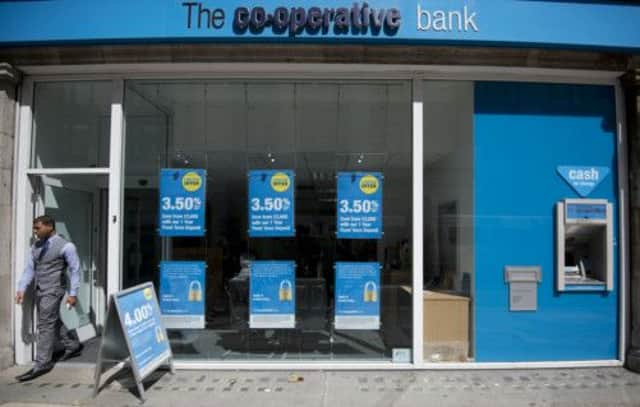Co-op pulls business loans amid concern over capital


While existing customers are unaffected by the move, the bank’s decision has sent shockwaves through the small business community.
Credit ratings agency Moody’s recently downgraded the bank’s debt to junk status and warned it could need taxpayers’ money to plug a capital shortfall which some analysts have said could be as high as £1.8 billion.
Advertisement
Hide AdAdvertisement
Hide AdEuan Sutherland, the Co-op group’s recently appointed group chief executive who is conducting a review of its operations, said the decision not to offer loans to new business customers was part of “our commercial strategy to play to the traditional strengths of the bank”.
“It will enable us to focus our energies and capital on both supporting our existing corporate customers and on growing our presence in the retail banking market.”
Although the bank will not look to lend to new corporate customers, Sutherland said the bank was “fully committed” to supporting existing business customers as well as lending to new retail customers.
Colin Borland, the Federation of Small Businesses’ (FSB) head of external affairs in Scotland, said that although the Co-operative Bank was a relatively small player in Scotland, the announcement “highlights the risk associated with the highly concentrated Scottish small business banking marketplace”.
He said: “We need to inject real competition into both business bank services and business finance, developing real options for all sorts of businesses with various needs. We need to ensure that growing and established businesses can get access to flexible and affordable finance so that they can drive growth and create jobs.”
The FSB offers its members business banking services through a tie-up with the Co-operative Bank but it did not believe this arrangement would be affected by the announcement.
Financial regulators said in March that UK banks must raise £25bn of extra capital by the end of the year to absorb any future losses on loans.
Royal Bank of Scotland and Lloyds Banking Group have already agreed plans to shore up their capital. The regulator is expected to complete discussions with other banks, including the Co-operative, by the end of June.
Advertisement
Hide AdAdvertisement
Hide AdThe bank’s core tier one capital ratio was 6.3 per cent at the end of 2012, compared to the 7 per cent regulators want.
The Co-operative pulled out of a deal to acquire 632 branches from Lloyds Banking Group and is selling its life insurance and asset management business to Royal London. It is also trying to sell its general insurance business.
The bank is one of the UK’s smaller lenders with 6.5 million customers and a 1.5 per cent share of the current account market.
It is currently without a chief executive following the resignation of Barry Tootell.
Paul Pester, who has been overseeing the sale of the Lloyds branches and other assets, known as Project Verde, was to have taken on the role of running the combined Co-operative and Lloyds businesses as an independent bank.